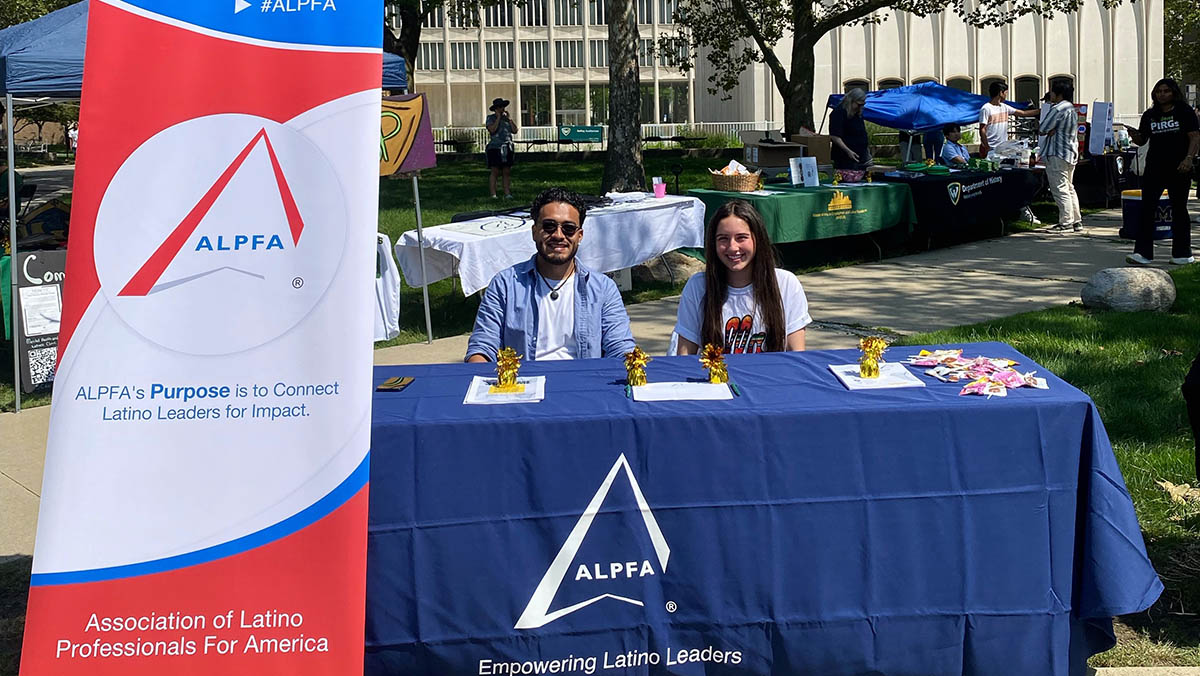
It was an idea that even COVID-19 couldn’t kill.
In 2020, when a small group of Latino business students at Wayne State University assembled to consider innovative ways to strengthen their professional networks and boost corporate diversity, they decided to turn not to new initiatives but to an organization that had been around since the 1970s: the Association for Latino Professionals for America (ALPFA).
The WSU ALPFA organizers became the first in the state to set up a chapter at a college or university. But by March 2020, the coronavirus outbreak had shuttered campus and was posing a serious threat to the student organizers’ hopes for community building. As quickly as they’d come together, the ALPFA members were forced to disperse.
Enter Miguel Orozco, Ximena Mazariegos, Sabrina Stahlberger and the other students who, three years later, picked up the idea that the pandemic forced their predecessors to abandon and are now working diligently to reinvigorate ALPFA.
“We really wanted something within our culture,” Orozco, a senior marketing major, recalled. “We wanted something where we could create a vibrant and inclusive community for all students. We wanted to broaden our perspective and broaden our culture within the community — and we wanted to collab with other Latino organizations, like the Center for Latino/a and Latin American Studies and the Latino Student Association. ALPFA gave us a chance to do that.”
“COVID interfered with the previous plans,” Orozco said. “We weren’t on campus so we couldn’t really go through with what we wanted to do — and things fell off.”
But the idea took on new life after students began returning to campus after the pandemic, and Orozco and the others finally re-established ALPFA — which began in Los Angeles in 1972 — earlier this year. But the new group of students haven’t just revived the group, they’ve also reshaped it. No longer aimed solely at business majors, the ALPFA chapter at WSU now has become an umbrella organization that embraces Latino students from myriad disciplines and a variety of majors.
“Our mission aims to create opportunities for Latinos in all majors,” explained Orozco, who also participates in the Multicultural Professional Readiness Education Program (MPREP) in the Mike Ilitch School of Business. “It used to be just business majors, but ALPFA started switching it up. We got supply chain majors, marketing majors like me, we have psychology majors. Now, we're all open to everybody.”
Mazariegos, one of the group’s co-presidents, pointed out that the expanded mission also benefits Wayne State. “We believe ALPFA is important to have as part of the WSU community because it promotes diversity and inclusion,” Mazariegos said. “It creates a platform for Latino students and professionals to connect, support one another, and share unique perspectives and experiences. This encourages a welcoming and culturally ranged campus community, which improves all students’ overall educational experience.”
Orozco said that, although the student chapter is still working on garnering support, the national arm of the organization has created partnerships with companies such as Ally Financial, Wal-Mart and Chase Bank. And these arrangements are also benefiting the smaller chapters.
“Ally has been sponsoring ALPFA even before our student chapter formed,” he said. “They help us with funding. They help us with networking events — stuff like that. We also had a regional conference in September that they sponsored.”
And while the group’s ranks are still growing as WSU students redefine ALPFA so is the organization’s reach. Earlier this fall, for instance, the group hosted an information session that garnered the names of more than 50 students who expressed interest in ALPFA. Meanwhile, Orozco and other members have been planning a series of informal outings aimed at attracting even more supporters.
“Since we're a commuter school, we're trying to do social events,” he said. “That's from going to bowling to Tigers games to anything that involves social interaction because, although it is kind of a professional organization, we want to make it more fun, too. But we do community engagement. We want to do network events, financial literacy workshops. We have mentorship programs and youth education initiatives.”
Sabrina Stahlberger, also co-president of the group, said that the current focus on Hispanic Heritage Month also has prompted reflection within the group about ALPFA’s role in the community.
“Hispanic Heritage Month definitely makes us reflect more on ALPFA’s mission,” she said. “Hispanic Heritage Month brings together individuals from diverse backgrounds to celebrate and learn about Hispanic culture. ALPFA can utilize this time to strengthen connections and build unity within its members and broaden the community. We take pride in our culture, whether that be music, dance, art exhibitions or discussions. Everything comes together to learn about the cultural significance of Hispanic heritage.”
Specifically, Orozco said, the group is looking to do more volunteer work in communities like Southwest Detroit, which has long been a hub for Latino cultures and communities in the city but also includes many other groups. He said this desire for greater community service extends from a broader ethos in the community that calls for individuals and organizations to look out for each other.
“Let me put it this way: Southwest Detroit is also named Mexican Town, but I've lived here all my life, and it's not about just Mexicans or Latinos,” said Orozco. “There are a lot of different races and cultures around here, and I think it's important because it sets us apart from everybody else. It’s very diverse, and it gives us a sense of unity. We come together, and we take care of our actual community.”
